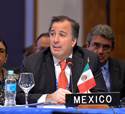The 44th OAS General Assembly, held this month in
Paraguay, demonstrated that the support and priority given to the
issue of "Development with Social Inclusion" is unanimous in the
region. Many of the
region's top diplomats also emphasized that, in order to make real
progress in this area, cooperation among countries is fundamental.
So too is the need for a broad range of stakeholders -- public and
private-- to become truly engaged as partners for development.
 "The issue before us must help us define
relevant and viable lines of action that will allow all countries to
make real progress towards development in democracy, and with social
inclusion," said the Hon. Horacio Cartes, President of the Republic
of Paraguay during the inauguration of the XLIV OAS General
Assembly. President
Cartes stated that "the ideal of genuine integration should
encourage cooperation," and that opportunities for collaboration
exist today in the region given the progress made by many countries
and the wide range of good practices that can be shared and
emulated.
"The issue before us must help us define
relevant and viable lines of action that will allow all countries to
make real progress towards development in democracy, and with social
inclusion," said the Hon. Horacio Cartes, President of the Republic
of Paraguay during the inauguration of the XLIV OAS General
Assembly. President
Cartes stated that "the ideal of genuine integration should
encourage cooperation," and that opportunities for collaboration
exist today in the region given the progress made by many countries
and the wide range of good practices that can be shared and
emulated.
In this spirit, the Ministers of Foreign
Affairs from OAS Member States unanimously approved the
"Declaration of Asuncion: Development with Social Inclusion",
recognizing that "eradicating hunger and poverty, in particular
extreme poverty, requires the promotion of public social, economic
and environmental policies that encourage, among others,
productivity, employment and sustainable and broad-based and
inclusive development in our nations".
Assembled Authorities also pledged to "promote
cooperation among the Member States" calling on the Organization,
and entrusting the OAS General Secretariat to "support the
coordination of cooperation efforts through existing mechanisms and
instruments."
 OAS
Secretary General,
José Miguel Insulza, stressed
that "although the spread of democracy and improved economic growth
have made it possible to reduce poverty and broaden prospects of a
better life for many citizens, these achievements have not made our
countries more egalitarian societies. On the contrary, the
prevailing injustice in wealth distribution and access to social
goods has reached levels that threaten to harm our democratic
fabric. And that is why the debate about inequality and exclusion
should no longer be purely economic but move to the public policy
arena." In this regard, the Secretary General posited that
“searching for broad agreements among social and political actors”
is the least costly way to confront inequality.
OAS
Secretary General,
José Miguel Insulza, stressed
that "although the spread of democracy and improved economic growth
have made it possible to reduce poverty and broaden prospects of a
better life for many citizens, these achievements have not made our
countries more egalitarian societies. On the contrary, the
prevailing injustice in wealth distribution and access to social
goods has reached levels that threaten to harm our democratic
fabric. And that is why the debate about inequality and exclusion
should no longer be purely economic but move to the public policy
arena." In this regard, the Secretary General posited that
“searching for broad agreements among social and political actors”
is the least costly way to confront inequality.
 In
the same vein, Ministers stressed the central theme of the
Assembly and the role played by the OAS in the follow-up process of
the Declaration, including the
Minister of Foreign Affairs of
Trinidad and Tobago, Winston Dookeran, further advanced the debate
as he acknowledged that “now we can recognize that growth and
development are linked in a way in which equality is in fact a
precondition for growth.” He observed that, for his government, the
discussions at the Assembly are seen “not only as a renewal, but
also as the regeneration of an interest in rebuilding the OAS as a
premium multilateral forum for discussion in an open, frank, and
candid way on issues that affect all of us.”
In
the same vein, Ministers stressed the central theme of the
Assembly and the role played by the OAS in the follow-up process of
the Declaration, including the
Minister of Foreign Affairs of
Trinidad and Tobago, Winston Dookeran, further advanced the debate
as he acknowledged that “now we can recognize that growth and
development are linked in a way in which equality is in fact a
precondition for growth.” He observed that, for his government, the
discussions at the Assembly are seen “not only as a renewal, but
also as the regeneration of an interest in rebuilding the OAS as a
premium multilateral forum for discussion in an open, frank, and
candid way on issues that affect all of us.”
 Among other issues, Foreign Minister of Venezuela, Elias Jaua
Milano, reflected on the importance of regional cooperation, stating
that, “the fight for integral development and poverty eradication is
not possible in a single country. It will only be possible through
economic and social complementarity and the economic and productive
integration of our countries.”
Among other issues, Foreign Minister of Venezuela, Elias Jaua
Milano, reflected on the importance of regional cooperation, stating
that, “the fight for integral development and poverty eradication is
not possible in a single country. It will only be possible through
economic and social complementarity and the economic and productive
integration of our countries.”
 Foreign Minister of
Saint Vincent and the
Grenadines, Camillo Gonsalves, observed that the central theme
for the OAS General Assembly “has profound local, regional, and
international implications, and provides the OAS with a succinct
raison détre as it looks
to its future role in an increasingly complex and interconnected
world.” Speaking of the current exercise underway on defining a
“Strategic Vision” for the OAS, the Minister stressed,
that "the four pillars of the OAS, as set out in the Charter are
interdependent and of equal importance. But the necessary and
desirable realignment of tasks and priorities must remain true to
the OAS Charter, which places strong emphasis on Development.”
Foreign Minister of
Saint Vincent and the
Grenadines, Camillo Gonsalves, observed that the central theme
for the OAS General Assembly “has profound local, regional, and
international implications, and provides the OAS with a succinct
raison détre as it looks
to its future role in an increasingly complex and interconnected
world.” Speaking of the current exercise underway on defining a
“Strategic Vision” for the OAS, the Minister stressed,
that "the four pillars of the OAS, as set out in the Charter are
interdependent and of equal importance. But the necessary and
desirable realignment of tasks and priorities must remain true to
the OAS Charter, which places strong emphasis on Development.”
 As
an additional expression of support to the theme and the work of the
Organization in this area,
United States Deputy Secretary of State, Heather Higginbottom
declared “I can think of no more fitting theme. Our region has
already accomplished much in this regard, yet there remains much
work to be done.” She also shared her
country’s conviction that “a vibrant and active OAS is central to
our common vision of creating a peaceful, prosperous, and socially
inclusive Hemisphere.”
As
an additional expression of support to the theme and the work of the
Organization in this area,
United States Deputy Secretary of State, Heather Higginbottom
declared “I can think of no more fitting theme. Our region has
already accomplished much in this regard, yet there remains much
work to be done.” She also shared her
country’s conviction that “a vibrant and active OAS is central to
our common vision of creating a peaceful, prosperous, and socially
inclusive Hemisphere.”
 In
addition, the Vice Minister of Foreign Affairs of
El Salvador, Carlos
Castaneda, described the theme as “historic and fully current, of
interest and concern to the peoples and nations of the Hemisphere.”
The Vice Minister acknowledged "the important work of the OAS" in
the area of development, stating that "El Salvador attaches great
importance to substantive dialogue advanced through the
Inter-American Council for Integral Development (CIDI), designed to
focus the work of the OAS in the area of development, thus
maximizing existing resources and utilizing the comparative
advantages of our Organization."
In
addition, the Vice Minister of Foreign Affairs of
El Salvador, Carlos
Castaneda, described the theme as “historic and fully current, of
interest and concern to the peoples and nations of the Hemisphere.”
The Vice Minister acknowledged "the important work of the OAS" in
the area of development, stating that "El Salvador attaches great
importance to substantive dialogue advanced through the
Inter-American Council for Integral Development (CIDI), designed to
focus the work of the OAS in the area of development, thus
maximizing existing resources and utilizing the comparative
advantages of our Organization."
 Secretary
of Foreign Affairs
of Mexico, José Antonio Meade Kuribreña, called on the
OAS to provide a constructive space “for defining priorities and
actions to meet our region’s particular needs”. He further noted
that this debate is linked to the current process of defining the
post-2015 agenda, an issue that is also recognized in the
Declaration of Asunción.
Secretary
of Foreign Affairs
of Mexico, José Antonio Meade Kuribreña, called on the
OAS to provide a constructive space “for defining priorities and
actions to meet our region’s particular needs”. He further noted
that this debate is linked to the current process of defining the
post-2015 agenda, an issue that is also recognized in the
Declaration of Asunción.
Although the topics covered at the General
Assembly were extensive, there was a clear consensus on the need for
greater coordination and collaboration among countries; for strong
and effective alliances with other actors from the private sector,
academia and civil society; and for continued OAS leadership in the
policy debate and facilitation of regional programming.
From imminently social issues such as access to
health services, quality education, social protection and other
public services; to issues with a more economic focus such as the
promotion of investment and entrepreneurship, decent and productive
work and financial and digital inclusion;
and environmental concerns
such as climate change and disaster risk management, the issues
addressed in the Declaration of Asuncion are aligned with the
development focus of the OAS, as implemented by its Executive
Secretariat for Integral Development (SEDI).
The conclusion of the XLIV General Assembly of
the OAS; the Declaration of Asuncion, and the discussions held by
the region’s Ministers of Foreign Affairs in Paraguay, provide a
clear set of working guidelines for the OAS-SEDI going forward, not
only in its areas of work, but also for strengthening and promoting
cooperation as a strategic tool to achieve common goals for
development with social inclusion.
As stated by Eladio Loizaga, Minister of
Foreign Affairs of the Republic of Paraguay at the closing, "The
unanimous adoption of the Declaration of Asuncion, entitled
"Development with Social Inclusion," established a strategic
priority for our governments, our states, and our nations of the
Americas. Our mission is development in democracy, for which we
place most emphasis on shared responsibility and responsibility of
our citizens. And we specifically want to stress the importance of
social inclusion. It is the only vehicle and the raison d'etre
of development."
To read the
speeches
in their entirety and
for additional information on the General Assembly, visit:
http://www.oas.org/en/44ga/

